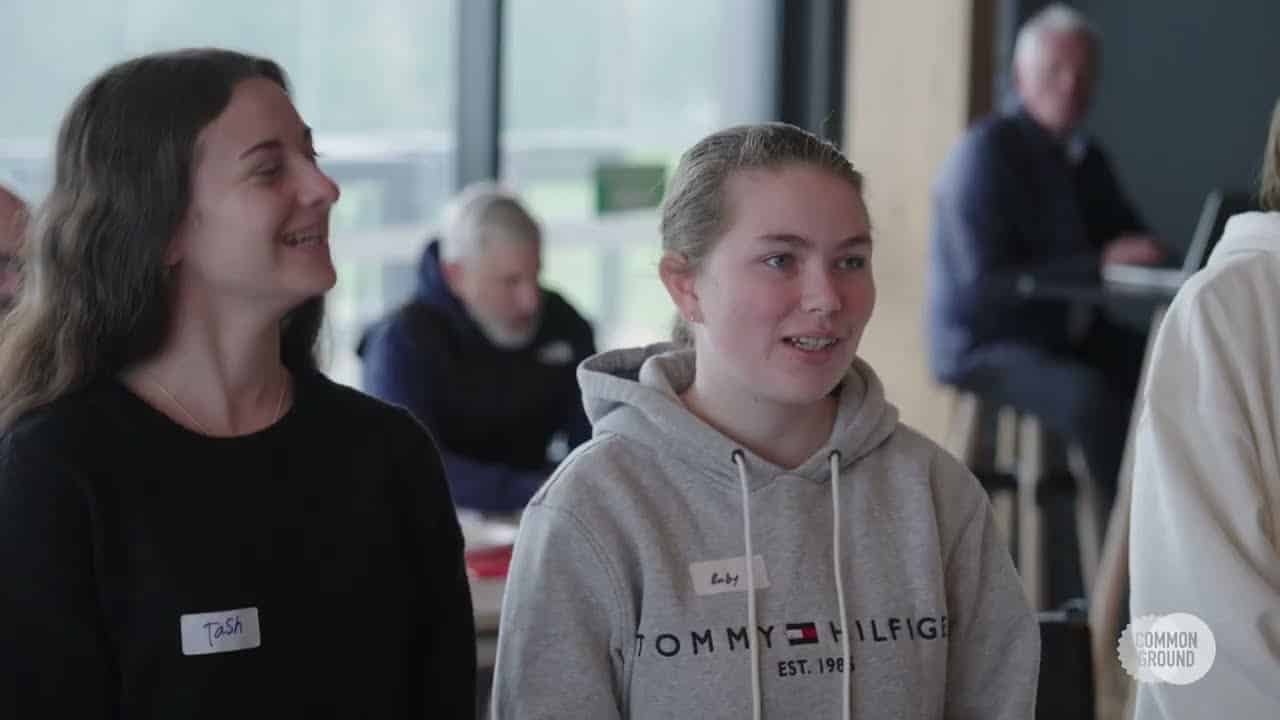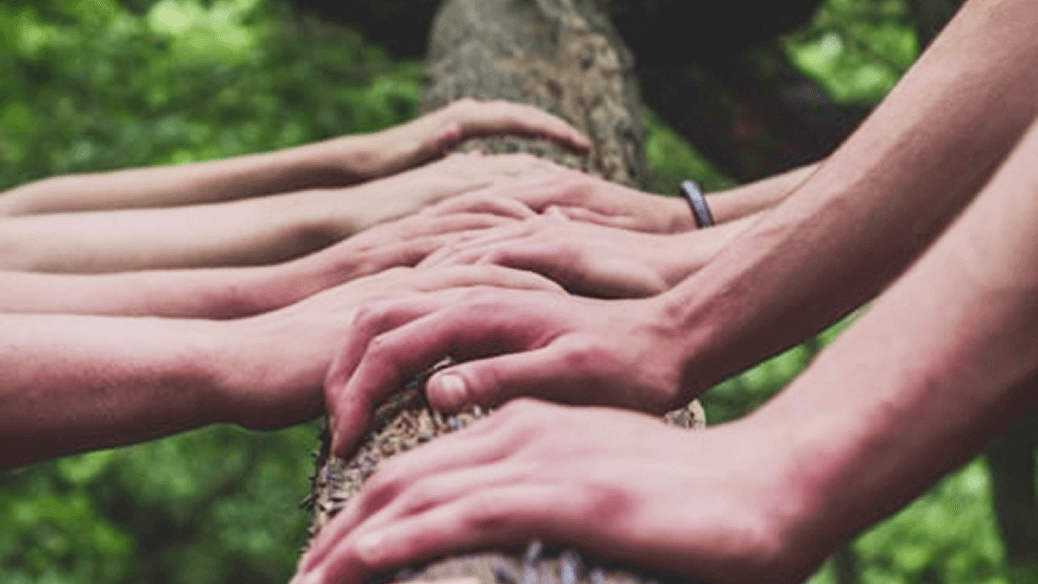

A PROGRAM TO COUNTER DISCRIMINATION & PREJUDICE, FOSTER DIVERSITY AND INCLUSIVENESS, AND BUILD SUPPORTIVE COMMUNITIES
Common Ground is a school-based education program for Year 9 and Year 10 students that builds awareness of prejudice and discrimination. It empowers young people with practical skills, confidence and knowledge to recognise and challenge discrimination, promote inclusion, and take positive action at school, online and in their local communities.

WHO IS IT FOR
Common Ground is for high school students in Years 9–10 (Stage 5). It is delivered in three sessions during a school term.

WHAT’LL BE LEARNED
The program uses problem-based learning to build thinking skills and character, empowering students to identify, discuss and challenge discrimination in media, social attitudes and their communities.

WHY US
Developed by The Ethics Centre and Courage to Care, two leading non-profit organisations, Common Ground combines expertise in ethics, anti-discrimination, and pedagogy.






Step out of the shadows in order to navigate a complex world
IOTA eCash klaytn tether tezos elrond. Chiliz chiliz hive stacks WAX. IOTA stacks filecoin nexo IOTA celo. Algorand binance TRON neo BitTorrent kadena klaytn
COUNTERING DISCRIMINATION
The impact of discrimination on young people’s wellbeing and developmental outcomes is well-documented.
The impact of discrimination on young people’s wellbeing and developmental outcomes is well-documented. While adolescents can spot discrimination, they often don’t know how to ‘call out’ and discuss it.
Added to this, discriminatory content circulates widely online and infiltrates the media consumed by young people. Common Ground empowers students to create positive social change and build a more inclusive society.
Through their learning and meaningful participatory projects, students become catalysts for lasting social change. Through experiential learning, student-led inquiry and project-based assessment, the program develops mutually reinforcing thinking skills and character strengths, providing tools and opportunities that empower young people to identify, discuss and challenge discriminatory norms, attitudes, ideas, and messaging in media and in their communities.


- Students learn through a variety of activities what bias is, how it affects actions and how to check their bias. They are introduced to a range of intellectual character traits through which they can analyse their experiences and the experiences of others. We focus on the three C’s – Curiosity, Carefulness and Courage – as we begin to question our perspective and the perspective of others.
- Students discuss their experience of discrimination (either direct or witnessed) and spend time between programs understanding their community’s awareness of these experiences.
- Students follow a recent case study to explore the impact of digital/social media on raising awareness.
- Students continue their interrogation of media and bias through an interactive, online, choose-your-own-adventure game.
- Finally, they spend the afternoon working in small interest-based groups on a specific discrimination issue of the group’s choosing. They begin by working through some unique design scaffolding, before researching their issue and starting the drafting or filming process. These videos will be submitted before Day 3 and with winners being presented on the day.
- All involved student cohorts within the LGA are brought together to explore practical ways they can safely be Upstanders when faced with or witnessing discrimination in their lives.
- Students will also have the opportunity to hear from and talk to young, local Australian activists and other community members making changes within their community and beyond.
- The day culminates in a presentation ceremony, where peer-chosen winners are awarded and videos are presented in front of teachers, parents and local community leaders.

DAY ONE
DAY TWO
DAY THREE







VIDEO PROJECT SHOWCASE
A selection of student video projects created by Common Ground participants.

Do we exaggerate the difference age makes?
Billy Kaplan

Do we exaggerate the difference age makes?
Billy Kaplan

Do we exaggerate the difference age makes?
Billy Kaplan
SHARE YOUR CONTENT
Interdum tellus duis dictum urna vitae vitae egestas. Vivamus semper pellentesque pellentesque imperdiet ultrices ut purus ac. Et tellus dignissim justo etiam.

WHAT STUDENTS & TEACHERS ARE SAYING
We thought it was going to be like every other program, you know, a bit repetitive, the usual “discrimination is bad, we should fix it” message. Which don’t get me wrong, it is – but this program offered more. It was a space where we felt heard. Our opinions were valued, and our concerns were taken seriously. And that kind of environment is rare, especially for young people.
STUDENT
We were able to have conversations where we were treated like adults. We weren’t just talked at, we were included. We had open, honest conversations about the different forms of discrimination and the real challenges they present in today’s world and the impacts that it has daily on the people in our lives. From that we had brainstorming sessions and some games to recognise the unconscious bias that is formed systematically.
STUDENT
Being able to talk about real issues about race, identity, culture, sexuality, gender and bias, without judgment, helped all of us grow. It made us think more critically about our own beliefs and the roles we play in society.
STUDENT
I now feel more confident in recognising discrimination, speaking up when I see it, and actively working against it. And I know many of the others feel the same way. The Common Ground Program didn’t just educate us- it empowered and inspired us. It showed us that change doesn’t always start with huge actions. It can start in the classroom, with a conversation, with listening and learning from each other.
STUDENT
We are incredibly proud of our Year 9 and 10 students who recently took part in the Common Ground program. A highlight for our students was their group video project on homelessness, which went beyond expectations. We commend [our students] not only for their thoughtful participation, but for turning their learning into meaningful action. This is exactly the kind of impact Common Ground was designed to inspire.
TEACHER
GET IN TOUCH
To find out more about hosting the Common Ground Program at your school, contact learn@ethics.org.au
SUPPORTED BY

PRESENTED BY
